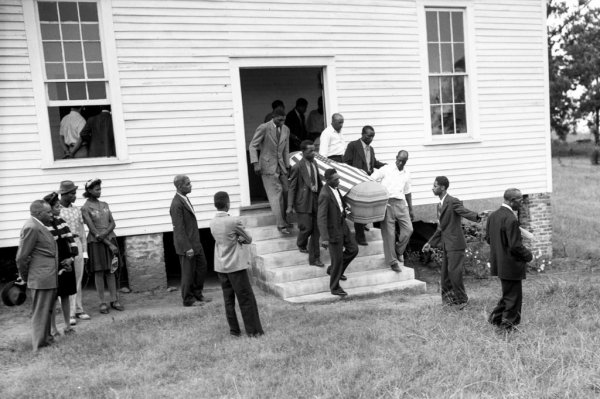Fighting Forever Secrets, COVID-19 and FOIA, and More: FRINFORMSUM 4/2/2020

Mourners carried the coffin of a lynching victim out of Mount Perry Baptist Church in Bishop, Ga., in 1946. The lynching was a quadruple killing. Photo Credit: The Atlanta Journal-Constitution/Associated Press
Appeals Court Rules in Favor of Forever Secrets
A federal appeals court in Georgia has ruled “that federal judges do not have the authority to unseal federal grand jury records, except for a limited set of circumstances governing grand jury rules of secrecy.” The case, Pitch v. US, sought grand jury records concerning the murder and lynching of two black couples (Roger and Dorothy Malcom and George and Mae Murray Dorsey) by a mob of white men in rural Georgia in 1946. The appeal court’s 8-4 decision overturned the lower court’s 2017 decision that the records – which are being held at the National Archives – be released. The Plaintiff’s lawyer, Joseph J. Bell Jr., has said he plans to appeal the decision to the Supreme Court.
In September 2019 the National Security Archive joined eight other scholarly organizations in filing an amicus brief in the case, arguing that courts have the inherent authority to unseal grand jury records in special circumstances and in cases of historical significance, just as they did in releasing the secret grand jury testimony of David Greenglass –the brother of Ethel Rosenberg. The Greenglass testimony, which was released thanks to a lawsuit brought by the National Security Archive and major historical and archival associations, suggests David committed perjury on the witness stand in the Rosenberg spy trial by providing false testimony against his sister in order to save his wife, Ruth.
The Archive was represented pro bono in its Pitch amicus by the Public Citizen Litigation Group; the other amici include the American Historical Association, the American Society for Legal History, the Organization of American Historians, and the Society of American Archivists.
Sign Up
Want to stay on top of the latest FOIA news? Click here to sign up for our weekly FRINFORMSUM (Freedom of Information Summary) email newsletter.
COVID-19 FOIA Updates
The COVID-19 crisis has impacted FOIA shops across the federal government. As of writing this:
- The FBI has stopped processing emailed FOIA requests, instead requiring requesters to send requests via snail mail. Buzzfeed News’ Jason Leopold broke the news, noting that the Bureau did not explain the rationale for demanding requests be sent by hand – at a time when all Americans are being strongly encouraged to stay home – rather than by computer.
- The FBI didn’t stop there; the Bureau later sent home the entire FOIA division with the argument that processing FOIA requests is not critical to the organization’s mission.
- The State Department reported in a court filing that its FOIA-processing capacity has plummeted by 96%. The radical drop is explained by the fact that State’s FOIA shop is heavily reliant on retired, part-time Limited Non-Career Appointment (LNA) Foreign Service Officers with decades of experience in foreign policy – most of whom are older and “very few” of whom were set to perform telework.
- State official Eric Stein said “he ordered the retired employees to stay out of the office for ‘several weeks’ because the FOIA work wasn’t considered mission critical, but he also expressed concerns for their health due to their age.”
- On March 20, Buzzfeed News’ Leopold posted a screenshot from the State Department’s FOIA page, noting “In response to the unprecedented COVID-19 pandemic, many agencies, including the Department of State, have been forced to suspend FOIA operations until further notice.”
- A Congressional Research Service report highlighted by Steve Aftergood on his Secrecy News blog gives a short overview of FOIA processing changes due to COVID. In addition to flagging changes at the FBI, it notes that the Centers for Disease Control and Prevention has stopped accepting mailed requests, instead requiring requests be submitted electronically.
- Adam Marshall of the Reporters Committee for the Freedom of the Press pointed out on Twitter that the CDC adapted to COVID-19 by publicizing not one – but four ways requesters could submit requests electronically.
- The Philadelphia Inquirer’s William Bender and Jeremy Roebuck have a good round-up of COVID’s impact on state and local FOI shops here.
Pentagon Wants to Make Spending Projections Secret
In the midst of the current public health crisis, the Defense Department is asking Congress to “rescind the requirement to produce an unclassified version of the Future Years Defense Program (FYDP) database,” which the DoD has provided since 1989 to provide spending projections for the next five years. Steve Aftergood has an excellent analysis of the problematic proposal, noting that “At a time when it is clear to everyone that US national security spending is poorly aligned with actual threats to the nation, the DoD proposal would make it even harder for Congress and the public to refocus and reconstruct the defense budget.”
The DoD has been required to produce an unclassified FYDO since 1989, but now argues that data mining tools could be applied to the large volume of information and allow adversaries to “derive sensitive information.”
The move to discontinue producing an unclassified FYDP comes as a part of a “broader retreat from public oversight and accountability, the Pentagon today does not make its legislative proposals easily accessible to the public,” Aftergood says. The Department has also stopped publishing its legislative proposals to Congress and has proposed a new FOIA exemption for unclassified documents concerning military techniques – an exemption that Congress has rejected at least four times.

Comments are closed.